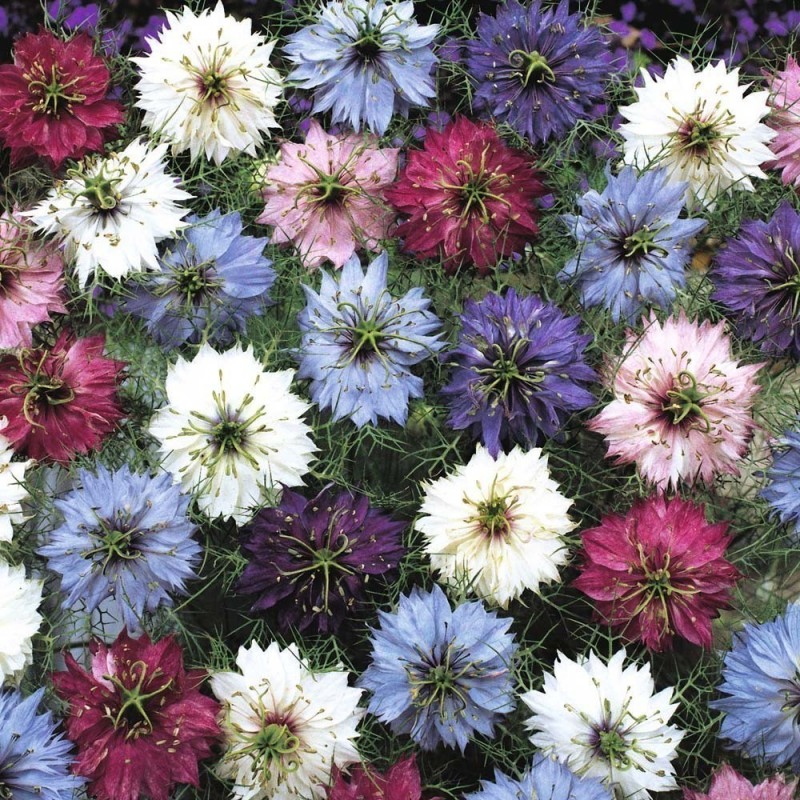
Love-In-A-Mist Multicolor, Ragged Lady Flower Seeds
Love-In-A-Mist Multicolor, Ragged Lady Flower Seeds (Nigella damascena)
Price for Package of 50 seeds.
Nigella damascena (love-in-a-mist, ragged lady) is an annual garden flowering plant, belonging to the buttercup family Ranunculaceae. It is native to southern Europe (but adventive in more northern countries
Love-In-A-Mist Multicolor, Ragged Lady Flower Seeds (Nigella damascena)
Price for Package of 50 seeds.
Nigella damascena (love-in-a-mist, ragged lady) is an annual garden flowering plant, belonging to the buttercup family Ranunculaceae. It is native to southern Europe (but adventive in more northern countries of Europe), north Africa and southwest Asia, where it is found on neglected, damp patches of land.
The specific epithet damascena relates to Damascus in Syria.[2] The plant's common name comes from the flower being nestled in a ring of multifid, lacy bracts. It is also sometimes called devil-in-the-bush.
It grows to 20–50 cm (8–20 in) tall, with pinnately divided, thread-like, alternate leaves. The flowers, blooming in early summer, are most commonly different shades of blue, but can be white, pink, or pale purple, with 5 to 25 sepals. The actual petals are located at the base of the stamens and are minute and clawed. The sepals are the only colored part of the perianth. The four to five carpels of the compound pistil have each an erect style.
The fruit is a large and inflated capsule, growing from a compound ovary, and is composed of several united follicles, each containing numerous seeds. This is rather exceptional for a member of the buttercup family. The capsule becomes brown in late summer. The plant self-seeds, growing on the same spot year after year.
Cultivation
This easily grown plant has been a familiar subject in English cottage gardens since Elizabethan times, admired for its ferny foliage, spiky flowers and bulbous seed-heads. It is now widely cultivated throughout the temperate world, and numerous cultivars have been developed for garden use. The most common variety is 'Miss Jekyll' which has blue flowers, but the more recent 'Persian Jewels' is a mixture of white, pink, lavender and blue flowers. 'Persian Rose' is pale pink. Other cultivars are 'Albion', 'Blue Midget', 'Cambridge Blue', 'Mulberry Rose', and 'Oxford Blue'. 'Dwarf Moody Blue' is around 15 cm (6 in) high. The white-flowered cultivar 'Miss Jekyll Alba' has gained the Royal Horticultural Society's Award of Garden Merit.


Your review appreciation cannot be sent
Report comment
Report sent
Your report cannot be sent
Írd meg véleményedet
Review sent
Your review cannot be sent
🌍 Globális szállítás az EU-ból
Világszerte szállítunk az Európai Unióból ajánlott küldeményként, átvételi visszaigazolással.
📦 Csomagkövetés
A csomagod követéséhez jelentkezz be a fiókodba, majd menj a Rendeléstörténet > Részletek menüpontra, ahol megtalálod a követési számot.
Nemzetközi követés: 17Track
RGxxxxxxHR típusú számok esetén: Posta.hr követés
🕒 Kérjük, várj legalább 24 órát a feladás után, hogy a követési adatok elérhetővé váljanak.
⚠️ Fontos tudnivalók
Utánvét nem elérhető.
Rendszeresen ellenőrizd a spam vagy kéretlen mappát az e-mail fiókodban az értesítésekért.
Kérjük, kizárólag a weboldalunkon található kapcsolati űrlapot használd.
Közvetlen e-mailekre nem biztos, hogy válaszolunk.
📱 Telefonszám megadása kötelező
Rendeléskor kötelező megadni a mobiltelefonszámodat az országkóddal együtt.
Példa: +36 30 123 4567
🚚 Szállítási feltételek
A nyomon követett csomag átvételekor átvételi aláírás szükséges.
Ne rendelj, ha:
postafiókba szeretnéd a csomagot
nem leszel otthon a kézbesítéskor
a csomagot a szomszédnak szeretnéd átadni (❌ ez nem lehetséges)
📬 Ha postafiók címet adsz meg, és a csomag elveszik, nem jár visszatérítés.
↩️ Csomag visszaküldése és újraküldés
Ha bármilyen okból visszaküldik a csomagot:
Visszaküldési díjat kell fizetned: 2 €
Valamint az újraküldés költségét is
⏱ Késések és nyomon követés
Ha a csomag még mindig a feladónál szerepel a követésben, az azt jelenti, hogy úton van.
A legfrissebb információkért keresd meg a helyi postahivatalt a követési számmal.
Nem vagyunk postaszolgáltató, így a csomagot nem tudjuk helyetted követni.
Nem vállalunk felelősséget a szállítás időtartamáért.
🔍 Eltűnt csomag ügyében vizsgálatot csak 30 nappal a feladás után indíthatunk.
✈️ Szállítási opciók
| Szállítás típusa | Feldolgozási idő | Biztosítás | Lehetséges késések | Megjegyzés |
|---|---|---|---|---|
| Standard | 7–10 munkanap | ❌ | 7–14 munkanap | Legolcsóbb opció |
| Prioritás | 1–7 munkanap | ❌ | 3–10 munkanap | Prioritásos feldolgozás – nem feltétlenül gyorsabb szállítás |
| Biztosított | 1–7 munkanap | ✅ | 3–10 munkanap | Visszatérítés elvesztés esetén (max. 150 € értékig) |
🕒 Várható szállítási idő:
Európai Unión belül: 3–20 munkanap
Világszerte: 5–30 munkanap
USA példák: 27, 22, 19, 17, 13 nap
💳 Fizetési módok
💶 Banki átutalás (SEPA / IBAN / SWIFT-BIC)
A fizetés leírásában kötelező megadni a rendelési számot (pl. SGS-19811702).
Ha hiányzik ez az adat, késedelmet vagy rendelés törlést okozhat.
Ha a befizetés nem érkezik meg 7 napon belül, a rendelést automatikusan töröljük.
🅿️ PayPal
Csak euróban történő fizetést fogadunk el PayPal-on keresztül.
Kérjük, a fizetéskor válaszd az eurót mint pénznemet.
💳 Bankkártyás fizetés
Kártyás fizetés a weboldalunkon keresztül: Exotic Seeds Store
Elfogadott kártyák: Visa, MasterCard, American Express, Diners Club, UnionPay, JCB, Discover stb.
💡 A vásárló viseli az esetleges tranzakciós díjakat.
Kérjük, küldd el a fizetés igazolását a gyorsabb feldolgozás érdekében.
📅 Egyéb információk
Hétvégén (szombat, vasárnap) nem dolgozunk fel rendeléseket és nem szállítunk.
Mindig olvasd el a fontos közleményeket a weboldalunkon (ünnepnapok, speciális feltételek stb.).
📫 Fontos:
Ne küldj közvetlen e-mailt nekünk. Csak a weboldalunkon lévő kapcsolati űrlapot használd.
Related Products

























